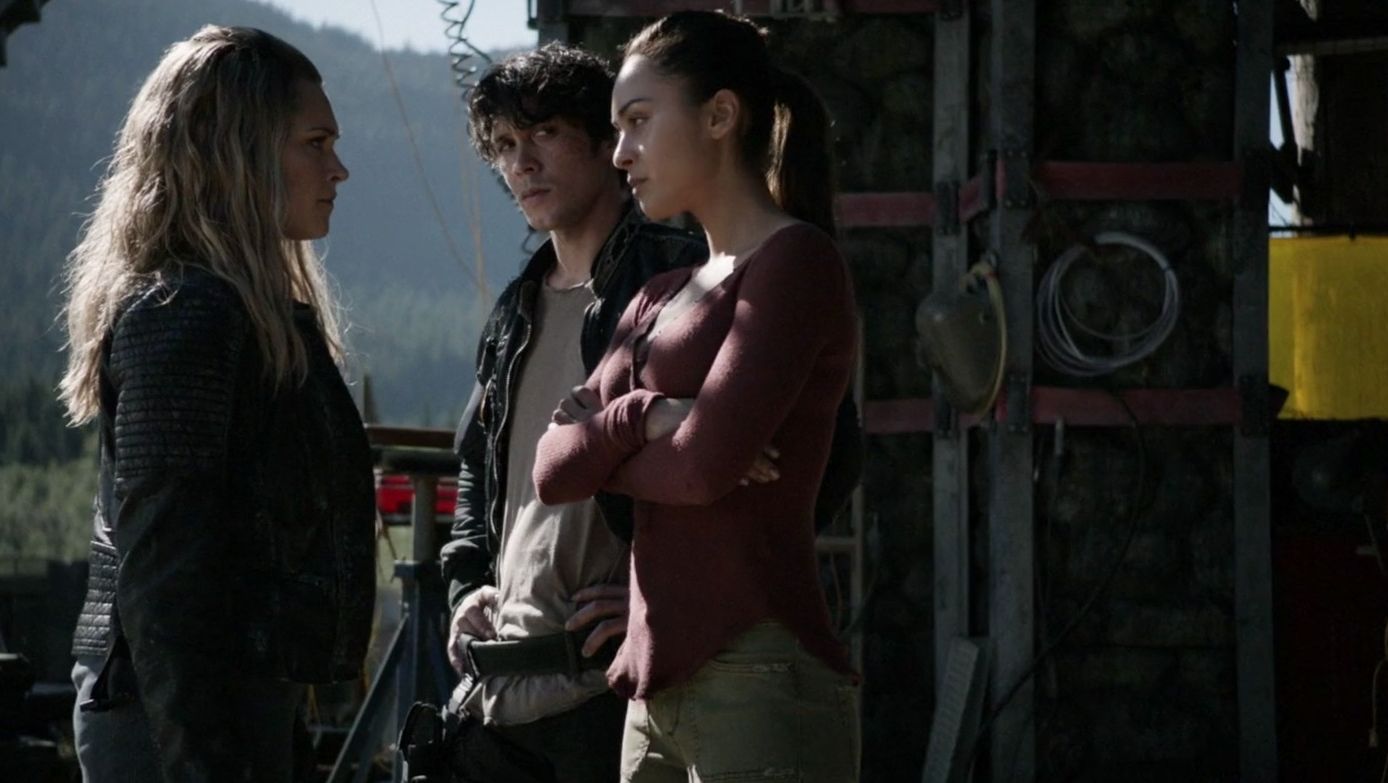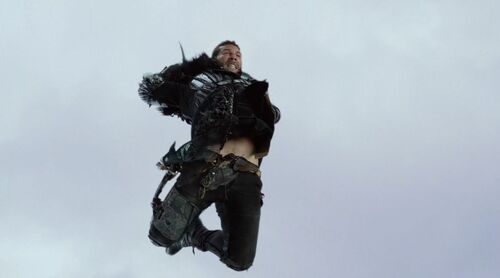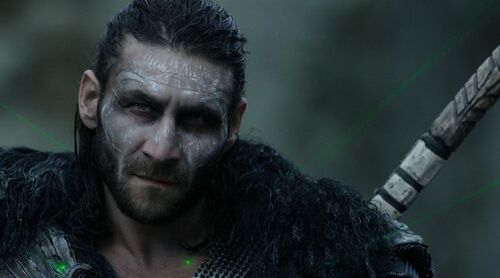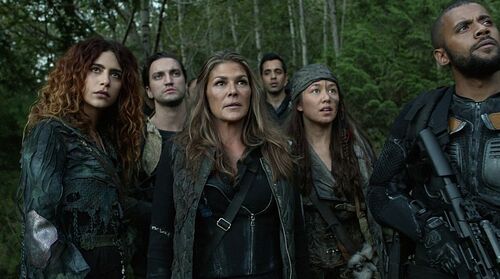
The 100 S4E2: "Heavy Lies the Crown"
 Heavy Lies the Crown sets clear emotional and moral stakes for this season of The 100, all while ruminating on the murky intersections of freedom, choice, leadership, and the ghosts that haunt not only individuals but societies.
Heavy Lies the Crown sets clear emotional and moral stakes for this season of The 100, all while ruminating on the murky intersections of freedom, choice, leadership, and the ghosts that haunt not only individuals but societies.
Uneasy lies the head that wears a crown.—Henry IV, Act III
THE GHOSTS OF DECISIONS PAST
The ghost of Jake Griffin looms large over The 100. Jake, Clarke’s father and Abby’s husband, was the one who found out that the Ark’s life-support systems were failing. His decision to release the truth to the public is the critical choice that leads to where the show is today. Because of that decision, Abby told Jaha about Jake’s plan, hoping that Jaha would talk Jake out of it. Instead, Jaha executed Jake and locked up Clarke in solitary confinement.
Now, four seasons later, the characters from the Ark are still grappling with those decisions and the ramifications of Jake and the Council’s choices. Those are the original sins that lead them all to Earth, lead them all to the traumas that they have endured since they landed. Only now, the younger generation is taking on those burdens and choices, providing the character interactions and atmosphere of the episode with a grim sense of déjà vu.
Heavy Lies the Crown does quick work in reminding us not only of the ethical and moral impact that Jake had but also of the emotional weight of his loss. As Abby is getting dressed after having sex with Kane (which, yay! and finally!), she fumbles a bit with the necklace her wedding rings on. Kane helps her with the clasp, reminding Abby that he knows Jake will always be a part of her life and their story. It’s a sweet moment and a stark contrast to the kind of reminders that Clarke has about Jake back in Arkadia.
For as empathetic as Kane is to Abby, Raven is less so to Clarke. She is frustrated by Clarke’s insistence on keeping the oncoming flood of nuclear radiation a secret. Raven’s opinion is that they need to crowdsource options. Knowledge of dire circumstances is Clarke’s echo of Jake, and Raven’s is Jake’s engineering pragmatism. Raven wants solutions, more minds on the problem, more people to help repair the Ark, and she needs more information about the ground and where/what other options there might be. There is only one efficient way of doing that: telling people.
But telling people might cause a panic in Arkadia, and worse, could break apart the tenuous coalition that Roan holds together in Polis. It’s a problem with no good answer, only a compromise: wait until they find a solution so they can blunt some of the panic.
During a planning session, Monty realizes that the Ark can become their ark, if they can patch it up and retrieve a hydro-generator from the crash site of Farm Station in Azgeda. The hydro-generator would allow them to make water, which would allow them to grow more food and sustain 500 people. It’s their first workable plan, and even though it’s still not enough, it’s a glimmer of hope. Bellamy, Monty, Miller, Bryan, and Harper set off to Azgeda, and Raven and Clarke stay behind to work.
Raven and Clarke’s relationship is one of the best on the show, and it’s refreshing to have them back on screen after they spent season three mostly apart. They respect each other and challenge each other, and it’s that dynamic that allows them to spar over the merits of keeping a secret versus telling. During one of their conversations, Jaha shows up to ask if he can help the Ark repair effort. He was an engineer on the Ark, he says, and might be useful. Once again, decisions that were made on the Ark loop back around. Raven hates Jaha and rightfully so. Not only did Jaha seek out and bring ALIE to them all, he was also responsible for some of the most brutal decisions that the Ark Council made, like the Culling.
Jaha is too canny to let this all go—he senses something is up. When Clarke walks by him later he asks what they are really preparing for. Clarke is silent, but Jaha gets it. After all, the specter of Jake might haunt them, but the person who made many of those decisions in season one—that’s Jaha. The man who floated her father and locked her up for a year is now offering Clarke leadership advice, and worse—it’s leadership advice that she identifies with. Clarke is both full of anger and revulsion, then reluctant acceptance of what Jaha has to say.
A note here to say that Clarke is obviously at the end of her rope. Eliza Taylor is playing Clarke’s subtle cracking with an economy of performance and a right-under-the-surface emotionality that is heart-wrenching. Clarke is a strong leader, but incapable of doing this alone. However, where the season is now, she’s still trying to hoard the burden, and it’s breaking her.
In Polis, Roan must reckon with both the legacies of Nia, his mother, and Lexa. Echo challenges him over and over again to not trust Skaikru and to rule like Nia would have: ruthless, making her own rules, and loyal only to Azgeda. Roan, knowing that praimfaya (trigedasleng for the apocalypse) is coming, needs to uphold the Council and keep the peace Lexa was trying to achieve before she died. The scenes here are short and mostly to keep the long-term plot running apace, but Roan is struggling to decide which course to take. He doesn’t want to lead like his mother, but when the ambassador from Trishanakru, Rafael, challenges him to a solo-fight for control of the throne, Roan is out of options. He won’t let Echo fight for him, but he’s not well enough from his gunshot wound to fight himself.
While still deciding what he should do, Echo suggests that she go to Arkadia to make sure Clarke is keeping her word. Roan agrees. Echo’s motives are tricky in this scene—I won’t be surprised if she tries to kill Clarke next week, but I wouldn’t be surprised if she just goes to spy like Roan requested. Either way, Roan’s decision feels like hisown, a way to both preserve the fragile peace and to be certain he’s not being duped.
The problem of the ambassador is solved by Octavia, who takes it on herself to resolve the situation. First, she offers to fight Rafael herself. Rafael refuses, so Octavia stabs him with a skewer through his ear and mops up the blood, making it look like an innocent, natural death. Like you do. Like Octavia does now, her cold-blooded assassin skills a new twist on the fighting skills she has had a passion for since season one.
In the final Polis scene, when word of Rafael’s death reaches Roan, he immediately suspects Octavia (as do Echo, Ilian, and Kane). The episode ends with the King even more wary of Skaikru and their agenda.
WE SAVE WHO WE CAN SAVE TODAY
No one can say what they would have done in Bellamy’s position. You can say what you think you would have done, what your principles now tell you, but until you’re in that situation you don’t know. And that’s not the point anyway.
The point here is that everyone has a history, point of view, and principles that collide in unexpected ways. In the case of blowing up the hydro-generator, Monty and Miller say take the machine, and don’t save those enslaved. What are 25 people in the face of potentially saving 500, and more than that, all of humanity? Harper and Bryan advocate for blowing the machine and using it as a distraction to help free them. In another nod to the past, Harper calls on their time in Mount Weather. Bellamy didn’t leave them then, she says. He shouldn’t leave the slaves now.
The choice falls to Bellamy. Each person has a vote, but it ends in a tie. As the leader and the last vote, the final say goes to him. He chooses to blow the hydro-generator and free the slaves, taking twenty-five more people back to Arkadia and reducing Arkadia’s chance of saving 500 people to 100.
There’s a lot of moralizing to do on this choice. Would you? Wouldn’t you? How could you say? But the point is that it tells us something important about where the characters are at the beginning of the season and sets the stakes for the rest of their choices. Harper is holding on to hope. Bryan is still loyal to Farm Station and holding on to his trauma from that experience. Miller and Monty both see the end of the world coming and are willing to be ruthless in the moment if it means humanity surviving in the end.
Bellamy, who is the leader of the squad and makes the final call, is starting in a position of hope, with the baggage of his past choices influencing him. He’s conflicted but once he makes the decision he’s resolute. When the Adventure Squad and the freed people arrive back in Arkadia, he unequivocally owns his decision to Clarke and Raven. Clarke and Raven have the right to be upset, but even in the face of Clarke’s disappointment and Raven’s anger, he stands by his choice. It’s a growth moment for Bellamy, though it leads to an even more complicated future for them all.
The amazing thing is that this is episode two out of thirteen. Who knows where these characters will end up by the end? But by having them make this choice now, the audience has a barometer for their change and what exactly they’re gaining or losing. So beyond the plot devices being clumsy (they have to be moved now? Really?), the episode still does fantastic work in clearly laying out where the characters start.
FREEDOM AND FREE WILL AT THE END OF DAYS
Heavy Lies the Crown also weaves in themes of freedom, free will, and choice. When the apocalypse is nigh, what does any of that mean and why does it matter? The episode opens with a flashback to Ilian, a new character from Trishanakru (the Glowing Forest—remember the butterflies Octavia loved in season one?). Ilian kills his brother under the influence of ALIE to force his mother to take the chip. Between killing his brother and his mother taking the chip, ALIE disappears (Clarke shutting down the City of Light at that moment), leaving Ilian with his dying mother. She tells Ilian to avenge her as she dies.
Only nine days have passed since Clarke shut down the City of Light, and wounds left by ALIE are healing for some, but festering for others. ALIE appearing at the beginning of the episode reminds the audience of that, and directly links ALIE to Ilian’s suffering, the physical wounds of Raven, Kane, and Roan, Jasper’s nihilism, and the dire situation that they all must navigate.
The sub-theme of ALIE and the City of Light also connects directly to Clarke and the secret she’s keeping. Clarke, looking at a population census, muttering, “there are too many people,” is an ominous recall of ALIE’s core problem: “There are too many people.” ALIE’s solution? Annihilate the world with nuclear bombs. We’ve yet to see Clarke’s, only we’re meant to question if, like ALIE, Clarke’s witholding of information is denying people of their choices and their free will.
Jasper is the one who parrots Clarke’s decision in Perverse Instantiation Part Two back to her. Then, Clarke decided to shut down the City of Light because ALIE took away people’s free will to persuade them to take the chip. They didn’t have all the information, they didn’t know what they agreed to, and under ALIE’s influence, they had no control over what they did. Now, in the beginning of the episode, Clarke is in the position of keeping secrets and Jasper directly challenges her on it. How can people have free will and choice without all the pertinent information? They can’t. And this isn’t a small secret either—it’s the end of the world. People should get to choose what they do with the time left to them. And isn’t that why Clarke saved them from ALIE, anyway? So they’d have a choice?
Clarke (and Bellamy) sees it differently. Until they have a solution, what’s the point in causing a panic? Jasper doesn’t let that reasoning slide. After all, that’s the exact line of thinking that caused the Council to send a hundred delinquents down to Earth in the first place.
At the end of the episode, when that solution—the hydrogenerator—falls through, Clarke doesn’t heed Jasper’s pointed criticism. Instead, she doubles down, and weaves together both a truth and a lie. The radiation is coming, she tells the crowd of Arkadians, but she is confident they can save everyone. In reality, they can only save 100 people. What they need is inspired workers for Raven, which they got, and political peace, which is what the lie helped accomplish.
Now to the question of Bellamy’s decision to blowup the hydro-generator to free the slaves. The main point of Bellamy’s decision is to explicate the starting point of his morality and emotional state for the season, but the consequence of the action is reminiscent of Clarke’s decision in Perverse Instantiation Part Two. Clarke made that decision with the full knowledge of the nuclear apocalypse to come, yet still, with faith in herself, in her friends she pulled the lever to shut down ALIE. Bellamy makes a similar decision. He has faith in his friends, hope for the time they have left, and compassion for those being mistreated. So he frees them, knowing full well that the nuclear apocalypse is coming and doing so compromises the number of people they might be able to save.
The 100 works best when the moral quandaries it proposes are murky and with no good answer. There isn’t one here. I’ll admit, even wrapping up this section is difficult, because what are hope and freedom in the face of an inevitable flood of radiation? Maybe Jasper’s nihilism and determination to finally have some fun on this brutal earth is the hopeful, free choice. But maybe Bellamy has it right, too, that you save who you can save today, and act with hope and compassion so you don’t set an ethical and moral legacy that makes human lives expendable. But then, there’s also Raven, Monty, and Miller, looking ahead to what is coming, and they’re acting out their own hope as well—the hope that through ruthless decisions now they can save humanity.
And Clarke? Clarke lands between it all. She has made the hopeful decision before, like discussed in Perverse Instantiation Part Two. She’s made the hard calls, too, specifically closing the dropship door in the season one finale, and pulling the lever with Bellamy that irradiated Mount Weather. Now, where does Clarke land? We don’t get the answer this episode, but with the stakes this high and all of her friends on different sides of the issue (for now), I can’t wait to watch her navigate that choice.
REVIEW
Wow. So! That was a lot of episode, and needless to say, I loved it. My only quibble with this episode was the plot mechanic that made freeing the slaves urgent, but it also allowed for the deep explorations of character and history that made Heavy Lies the Crown a spectacular episode and a gift for long-time viewers.
Christopher Larkin and Monty deserve a shout-out. Larkin is an amazing actor who continually finds the nuance and balance between Monty’s compassion and his ability to make the hard decisions. The scene after they blow the hydro-generator and Bryan tells Monty that the guard they captured is the one who killed his father is absolutely chilling. It’s your kill, Bryan tells him. Monty instead cuts the chains of the slaves, and with a nod to Riley, indicates that this is their kill. The camera stays on Monty, and we watch as grief, despair, and rage cross his face.
As usual, the technical aspects of The 100 make it a pleasure to watch. The subtle motifs of rain and storm clouds rolling in indicate that the flood is coming, both the black rain and the radiation. Slicing, cutting, and swordplay make more appearances as the lethal action of choice, indicating that the who will be cut? theme will play out in several ways throughout the season.
Prior season parallels could feel redundant, but instead, The 100 has pulled off the crafty narrative trick of making the situations feel even more fraught. That the characters are aware they’ve all been here before is what makes the story choice work. The past has become prophecy, and every action they take comes with the fatalistic knowledge that they’ve all been here before.


